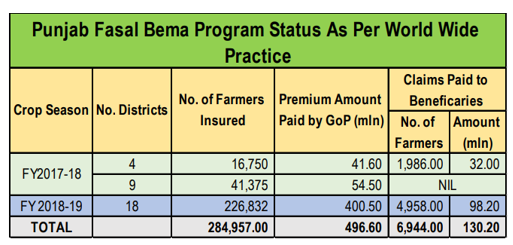INP-WealthPk
Arooj Zulfiqar
Agricultural insurance is crucial for ensuring farmers’ financial security in the wake of extreme events, which often cause extensive damage to their crops. However, unfortunately, agri-insurance has not attracted significant attention in Pakistan primarily because the country's agricultural sector is riskier due to a range of factors. Talking to WealthPK, Irshad Khan Abbasi, Head of Innovation and Integration at Pakistan Poverty Alleviation Fund (PPAF), said Islamabad had consistently lagged behind the rest of the world in terms of agricultural insurance.
“A lot of farmers in developed countries use agriculture insurance as a form of financial protection.” “Such type of insurance is vital for a country like Pakistan, a largely agrarian nation, where agriculture accounts for 22% of GDP, and at least 37.4% of the labour force is attached to the sector, meaning over 65-70% of population depends on agriculture for livelihood,” he explained.
Irshad Abbasi said as Punjab met almost 76% of the country's total agricultural needs, so there was a dire need for introduction of agro-insurance in the province. He pointed out that for the first time in 1983, livestock insurance was introduced in Pakistan, but the endeavour remained unsuccessful. “For the success of any agro-insurance programme, it is essential to connect farmers with banks, a crucial step in overcoming financial vulnerability of growers in the event of losses to their crops,” he said.
The PPAF officer said enabling farmers’ access to banking facilities would help them cope with the effects of floods, droughts, locust attacks, or fires as they would be assured of being compensated for losses. “Another reason why insurance is crucial in Pakistan is that in addition to the damage brought on by natural disasters, farmers also have to deal with depleting irrigation water.
These challenges disrupt farmers' revenues, rendering them unable to pay back their loans,” he said. Irshad Abbasi maintained that for an agriculture insurance initiative to succeed, the government’s seriousness was important. “Farmers must have economic security to make up for the damage that natural disasters cause to their crops.
The government should ensure speedy rehabilitation of the farmers after a natural disaster strikes, and compensate them for the damaged crops.” He pointed out that the Punjab government started a crop insurance programme back in 2018, making insurance of cotton or rice crops compulsory in Sheikhupura, Sahiwal, Lodhran and Rahimyar Khan. “A positive outcome led to its expansion to 18 other districts in 2019,” he added.
Source: https://crs.agripunjab.gov.pk/node/197
Though the volume of agricultural loans has increased over the past few years, there has not been much progress in crop insurance programmes. Launching a crop insurance initiative at the national level will go a long way in ameliorating the suffering of largely the poor farming community, which has to fend for itself in the wake of frequent natural calamities. The initiatives launched to this effect in the past have been marred by delayed or no assessment of the crop losses, and irregularities in payments to farmers.
Credit : Independent News Pakistan-WealthPk













